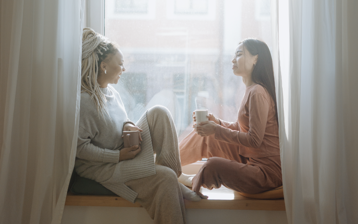Whilst some of us look forward to Autumn and all that it brings, the striking change in colour of the leaves as the trees start to shed, dressing up as our favourite spooky characters for Halloween and let’s not forget bonfire night. However it also brings with it the rolling back of the clocks which results in longer, darker evenings.
These longer nights and shorter days have been attributed to the onset of Seasonal Affective Disorder (SAD) which is a type of depression brought on by the reduced amount of sunlight we experience during the darker winter months. It can affect 4-6% of people with your odds of being affected multiplied by 10 if you’re a woman. This drop in exposure to sunlight can effect a person’s activity levels and cause a number of symptoms including decreased motivation, food cravings and trouble sleeping, to name a few. If you find that you are affected by SAD this article shares with you various things you can do to help ease the effects.
Stay in contact with friends and family
As the days get colder it’s easier to find excuses to stay in and avoid the cold weather but isolation has been shown to have a causational effect on your mental state, which could result in you feeling down. However you don’t necessarily have to head outside to socialise. Most people have access to video calling where you can chat to just one or lots of people at once, you could even host a virtual games night all from the comfort of your front room. Regular interaction like this can reduce stress and improve your mood.
Plan your day around the sunlight
Since sunlight is harder to come by during these months it’s a good idea to make the most of it when you can. This could mean planning your schedule to do things earlier in the day or sit near a window while you’re working if you can’t find the time to get out during these hours.
Be active
Regular exercise has been proven to help boost your mood. However this doesn’t have to involve 5k runs, all you need to do is get your body moving a little bit more each day. This can either be done at your local gym if you have a membership, or in the comfort of your own home.
Improve your sleep schedule
A regular sleep schedule can vastly improve not only how much sleep you get but also the quality of that sleep. If you’re struggling to get in to a good pattern then there are lots of proven techniques to try. Such as reduce how much time you spend on your electrical devices before bed as the blue light restrains your melatonin intake, this is the chemical responsible for your sleep-wake cycle. Try herbal teas that contain chamomile which is proven to have a tranquilizing effect. Replacing regular tea with a herbal alternative is also beneficial because it lacks caffeine which is known to disrupt sleep if consumed too close to bed time.
Reduce your alcohol intake
Sometimes people who find themselves feeling down may find themselves having an extra glass or two of wine or whisky during the week to make themselves feel better. However the chances are that this would only further enhance the feelings of sadness. Instead of increasing your alcohol intake at times like this, we would suggest cutting down on alcohol and try some of the things we suggest in this article.
Talk to a professional
SAD is a legitimate form of depression, so if you’re struggling to combat your symptoms on your own we suggest reaching out to a mental health professional as they are best placed to recommend suitable treatment. However if you are in need of more immediate help or want someone to talk to then The Samaritans are a great charity to get in touch with. They offer emotional and confidential support 24 hours a day, simply call 116 123 for free, or email: jo@samaritans.org.uk and you’ll receive a response within a day.








